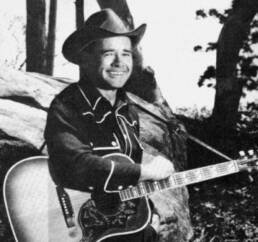These life stories may contain descriptions of childhood trauma and abuse, as well as images, voices and names of people now deceased. If you need help, you can find contact details for some relevant support services on our support page.
Pioneering country music singer-songwriter, Buddy Williams (1918-1986)—known as The Yodelling Jackaroo—was in an orphanage and foster care as a child.
Buddy Williams was born Harry Taylor in Newtown, Sydney and soon after left at an orphanage in Glebe where he lived for seven years.
From there, Harry was put into foster care with a farming family in Dorrigo, a small town on the Northern Tablelands of NSW. In foster care, Harry was treated as an unpaid labourer but he preferred this situation to the orphanage.
During visits with neighbours, Williams heard recordings of American singer-songwriter, Jimmie Rodgers (1897-1933)—widely considered the “father of country music”—and was captivated.
Harry Taylor ran away at 15 and supported himself with labouring work. He learned to play guitar and took up busking—on a dare.
In 1936, he made a successful appearance at the [Grafton] Jacaranda Festival and as Buddy Williams, he continued to earn his living busking around the country, spending some time at Newcastle, before heading for Sydney (AllMusic).
Buddy Williams made his first recordings—with six of his own songs—for EMI Records, then Regal Zonophone Records, in September 1939.
…he became the first Australian-born solo country recording artist…Later stating that he gained inspiration from [American folk singer] Goebel Reeves and Jimmi Rodgers, he continued busking but soon gained radio exposure, where he built a reputation with his ballads and yodels (AllMusic).
In 1939, Williams enlisted in the Australian Army but continued making recordings of his music. He was seriously wounded in Borneo towards the end of WWII.
After he recovered, Williams set up a travelling rodeo variety tent show with his second wife, Grace.
Ten years or so later, Williams gave up the rodeo show and toured for most of the year with the Buddy Williams Variety Show, performing primarily in country towns but occasionally in big cities. Karen Williams, Buddy’s daughter recalls:
I remember him driving from one country town to another with Grace and various people who either sang, danced, juggled, played all sorts of musical instruments, or put a mouthpiece in, and got hauled up to the ceiling… you guessed it – by mouth!
… During this time I remember the halls being packed with people and besides all the other exciting attractions, Buddy would do a sharp shooting act in the aisle of whatever hall he happened to be in (illegal today of course).
Around 1965, Williams was joined on stage—and on recordings—by his son Harold and daughter Kaye and from 1972, by his youngest daughter, Karen.
In 1977, Buddy Williams was only the second artist (after New Zealand-born Tex Morton) elected to the Australian Roll of Renown.
Two years later, Williams was featured in a documentary, The Last Fair Dinkum Aussie Outback Entertainer. The documentary—focused on Williams during a far North Queensland tour—was narrated by Williams’ friend, advertising entrepreneur John Singleton who had often showcased Williams’ songs when he was a radio host.
There is little doubt that [Buddy Williams] has been a major inspiration for many Australian artists, and experts on the genre rate some of the recordings that he made between 1942 and 1946 among the best examples of Australian country (AllMusic).
Buddy Williams died in 1986. He is buried in the Lutwyche Cemetery, Brisbane along with his infant daughter who died in 1948 and his second wife Grace.
A wax model of Buddy Williams is included in the Country Music Wax Museum at Tamworth and a commemorative bust was erected in 1991—the first of many such sculptures of Australian country music greats—in Bicentennial Park, Tamworth.
References
“Buddy Williams.” Monument Australia. https://monumentaustralia.org.au/themes/people/arts/display/23345-buddy-williams
“Buddy Williams Biography.” AllMusic. https://www.allmusic.com/artist/buddy-williams-mn0000937932/biography
“Pioneers Parade.” Destination Tamworth. https://www.destinationtamworth.com.au/operator/country-music-pioneers-parade/
Williams, Karen. “A Tribute to Buddy Williams.” History of Country Music in Australia. https://www.historyofcountrymusic.com.au/tributetobuddy.html
Image available from here.
